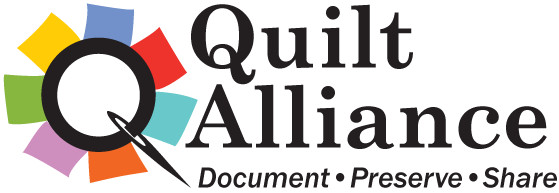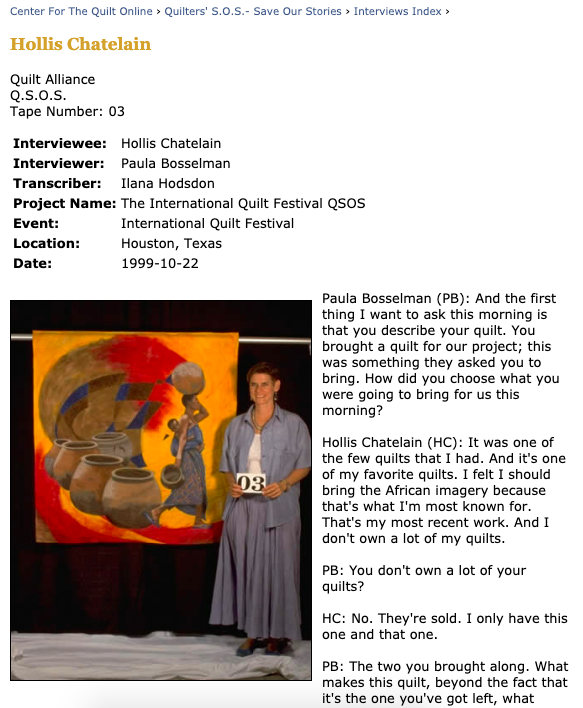 In October of 1999, a handful of quilters and quilt scholars gathered at the International Quilt Festival in Houston, Texas, to try something completely new: an oral history project focused on quilters’ stories, with members of the quilting community interviewing each other about their quiltmaking history, their proud moments, favorite techniques, their inspirations, frustrations, families, technologies, and communities.
In October of 1999, a handful of quilters and quilt scholars gathered at the International Quilt Festival in Houston, Texas, to try something completely new: an oral history project focused on quilters’ stories, with members of the quilting community interviewing each other about their quiltmaking history, their proud moments, favorite techniques, their inspirations, frustrations, families, technologies, and communities.
Little did these volunteer interviewers and first interviewees know that the project–Quilters’ S.O.S. – Save Our Stories (QSOS)–would continue for another two decades, documenting the stories of over 1,100 quilters from around the world. It would include interviewees who’ve won some of the quilt world’s biggest prizes, to a six-year-old who recently finished her first quilt. Since those first interviews, QSOS has ensured that the diverse history of two decades of quiltmaking, in sewing rooms, international quilt shows, quilt shops, and community centers, has been captured.
At first, these stories were captured with cutting edge technology: the cassette tape! In 1999, the first interviews were recorded on tape, and laboriously transcribed by volunteer transcribers who’d write out every word and [laugh] and [pause for crying] in each transcript. Eventually, those transcripts would be posted online for anyone to read.
Twenty years ago, that’s most of what you could do on the internet: read and look at pictures. Technologies for streaming audio and video were clunky and expensive at best. But fast-forward to 2019, and it seems practically quaint to encounter a web-page that’s just words. It’s not enough to bring you a transcript on a web page; we want you to be in the room where the stories are unfolding, to be transported to the living room or quilt show where these stories were captured, and to hear quilters tell their stories in their own voices.
You may have heard about our new initiative–to make the voices of the 1,100+ quilt stories we’ve recorded since the QSOS project began 20 years ago available online. It’s a big task, taking those Radio Shack cassette tapes and making them available for anyone in the world to hear. The tapes, despite their world-class storage conditions at the Library of Congress’ Audio-Visual Conservation Center, are aging fast. Each cassette needs to be digitized in real time, meaning that a 45 minute interview will take at least 45 minutes to play through and be recorded. Each recording is reviewed for quality and completeness, labeled correctly, added to a web server so we can beam it to your computer… and that’s all just to get it online! We’re grateful to have support from our partners at the University of Kentucky’s Louie B. Nunn Center for Oral History, who are working to digitize and prepare these interviews.
Venetta Morger and her Cherrywood Challenge quilt
Despite the time and care it takes to make these recordings available online, it’s entirely worth it. The addition of audio transforms the experience of a QSOS interview. It offers nuance and emotion, textures and context that were entirely missing from the written transcript. Here’s just one example, from a 2011 interview with Venetta Morger. At the end of her interview, interviewer Sandi Goldman asked if she had anything to add. Venetta says:
“I just know that four years ago when I started quilting full-time, having the time to quilt, my kids were all gone and off to school. I really dreamt that one day my quilt would hang in Houston. My quilt hung in Houston two years later in the special exhibits, with the Texas Guild exhibit that they do. I never would have imagined that it would have been picked as one of the best 200 quilts made in Texas in the last 25 years. But I hope that by having a dream, by encouraging others to have a dream, and making it big, that there’s nothing dreaming big. It’s absolutely the way that we can head towards a goal, and my next dream is to have a quilt in the winners circle here in Houston one of these days.”
You can tell from the excerpt that she’s excited to be included in the exhibit. But when you listen to the recording, you can hear the pride in her voice. It’s a difference experience, hearing Venetta tell her own story, rather than reading it in your own voice, in your own head!
Take a listen to this excerpt from an interview with Hollis Chatelain, talking about the influence of her time in Africa as a Peace Corps volunteer. There’s so much that doesn’t come through in the transcript: you can hear the loudspeaker announcements that are still ubiquitous at the International Quilt Festival, you can hear the ease and familiarity with which she switches from English to French to provide a pronunciation of ‘palétuvier’, the French word for a mangrove tree. There’s a rhythm to her recollections of the African landscapes she’s drawing from that’s not represented by the flat words on a page.
Even that loudspeaker announcement that interrupts Hollis’ interview is part of that interview’s story! It sets the scene for her interview at the International Quilt Festival and it’s not too far-fetched to think that future quilt researchers may find in that short announcement a little bit of context to better understand the quilt show landscape of 1999!
In the same way, I love hearing this recording of Denyse Schmidt’s QSOS interview recorded at the 2012 Quilters Take Manhattan event. You can hear the hum of the audience and their laughter at times: this is an interview recorded in front of a large audience and though it’s hard to tell just from the transcript, it has a slightly different flow than an interview conducted between two women in a living room or quilt shop.
We’re so excited about all of the possibilities this newly-available audio affords us as a quilting community. Whether you’re a quilter who loves hearing others talk about their quilting journey, a women’s history researcher interested in crafting communities, a documentary maker, a family member eager to hear the voice of a loved one who’s passed away, we hope you’ll find something to treasure in these interviews. We’re thrilled to bring these quilters stories to you, in their own voices.
We’ll be working on adding new interviews as the audio is digitized, so keep your eyes on the project! If you’re interested in learning more about supporting the transition of QSOS interviews to their new platform, please check out our QSOS 20th Anniversary Fund Drive.



This is amazing and wonderful. I am excited to hear some of the stories.